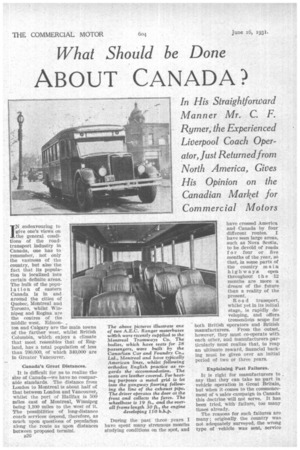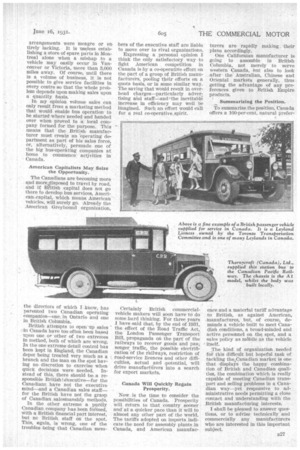What Should be Done
Page 44

Page 45

If you've noticed an error in this article please click here to report it so we can fix it.
ABOUT CANADA?
IN endeavouring to give one's views on ..the general conditions of the roadtransport industry in Canada, one has to reanember, not only the vastness of the country, but also the fact that its population is localized into certain definite areas. The bulk of the population of eastern Canada is in and around the cities of Quebec, Montreal and Toronto, whilst Winnipeg and Regina are the centres of the middle west. Edition
ton and Calgary are the main towns of the farther west, whilst British Columbia, which enjoys a climate that most resembles that of England, has a total population of less than 700,000, of which 340,000 are in Greater Vancouver.
Canada's Great Distances.
It is difficult for us to realize the Size of Canada—we have no comparable standards. The distance from London to Montreal is about half of that between Loudon and Vancouver, whilst the port of Halifax is 500 miles east of Montreal, Winnipeg being 1,100 miles to the west of it. The possibilities of long-distance coach services depend, therefore, as much upon questions of population along the route as upon distances between proposed termini.
s2f.3 During the past three years I have spent many strenuous months studying conditions on the spot, and
have crossed America and Canada by four different routes. I have seen large areas, such as Nova Scotia, to be devoid of roads for four or five months of the year, so that, in some parts of the country main highways open throughout the 12 months are more a dreamof the future than a reality of the present.
Road transport, whilst yet in its initial stage,, is rapidly developing, and offers tremendons scope for both British operators and British manufacturers. From the outset, however, they must co-operate with each other, and Manufacturers particularly must realize that, to reap an ultimate reward, financial backing must be given over an initial period of two or three years.
Explaining Past Failures.
It is right for manufacturers to , say that they can take no part in vehicle operation in Great Britain, but when it comes to the commencement of a sales campaign in Canada this doctrine will not serve. It has been tried, with failure, too many times already.
The reasons for such failures are many ; originally the country was not adequately surveyed, the wrong type of vehicle was sent, service arrangements were meagre or entirely lacking. It is useless establishing a store of spare parts in Montreal alone when a mishap to a vehicle may easily occur in Vancouver or Victoria, more than 3,000 miles away. Of course, until there is a volume of business, it is not possible to give service facilities in every centre so that the whole problem depends upon making sales upon a quantity basis.
In my opinion volume sales can only result from a marketing method that would enable 'bus operation to be started 'where needed and handed over when proved to a local company formed for the purpose. This means that the British manufacturer must create an -operating department as part of his Sales force, Or, alternatively, persuade one of the big bus-operh ting companies at home to commence activities in Canada.
American Capitalists May Seize the Opportunity.
The Canadians are becoming more and more4iisposed to travel by road, and if British capital does not go there to develop bus services, American ,capital, which means American vehicles, will surely go. Already the American Greyhound organization, the directors of which I know, has parented two Canadian operating conmanies—.-one% in Ontario and one in British Columbia.
British attempts to open-up sales in Canada have too often been based upon one or other of two extremes in method, both of which are wrong. In the one extreme detail control has been kept in England, the Canadian depot being treated very Mitch as a branch and the man on the spot having no discretion to exercise when quick decisions were needed. Instead of this, there should be a responsible British k eXecutive—for the Canadians have not the executive mind—and a Canadian sales staff— for the British have not the grasp of Canadian_ salesmanship methods.
In the other extreme a purely Canadian comPany has been formed, with a British financial part interest, but no British staff on the spot. This, again, is wrong, one of the troubles being that Canadian mom bers of the executive staff are liable to move over to rival organizations.
Expressing a personal opinion I think the only satisfactory way to fight American competition in Canada is by a co-operative effort on the part of a group of British manufacturers, pooling their efforts on a quota basis, or in some similar way. The saving that would result in overhead charges—particularly adver; tising and staff--and the inevitable increase in efficiency may well be imagined. Such an effort would call for a real co-operative, spirit.
Certainly British commercialvehicle makers will soon have to do some hard thinking. For three years I have said that, by the end of 1931, the effect of the Road Traffic Act, the London Passenger Transport Bill, propaganda on the part' of the railways to recover goods and pas: senger traffic, the possible electrification of the rhilways, restriction of road-service licences and other difficulties, actual and ,potential, will drive manufacturers into a search for export markets.
Canada Will Quickly Regain Prosperity.
Now_ is the time to consider the possibilities of Canada. Prosperity will return to that country sooner and at a quicker pace. than it will to almost any other pert of the world. The tariffs adopted on imports indicate the need for assembly plants in Canada, and American mauufac
turers are rapidly making , their plans accordingly.
One Californian manufacturer is going to assemble in British Columbia, not merely to serve western Canada, but also to look after the Australian, Chinese and Oriental markets generally, thus getting the advantage of any preferences given to British Empire products.
Summarizing the Position. ,., • To summarize the position, Canada offers a 100-per-cent. natural prefer ence and a material tariff advantage to British, as against American, ,inanufaxtures, but, of course, demands a vehicle built to meet Canadian conditions, a broad-minded and active personnel on the spot, and a sales policy as mobile as the vehicle itself.
The kind of organization needed for this difficult but hopeful task of tackling the,Canadian market is one that displays the happy combination of British and Canadian qualities, the combination which is really capable of meeting Canadian transport and selling problems in a Canadian way—yet responsive to administrative needs permitting a close contact and understanding with the British manufacturing interests.
I shall be pleased to answer questions, or to advise technically and commercially any manufactUrers who are interested in this important subject.




































































































